Archive
10 December 2020
Ad van Wijk in various media

According to professor Ad van Wijk, hydrogen is one of the most sustainable substances to store energy.
09 December 2020
Existing neighbourhoods energy-neutral thanks to innovative solar heat network
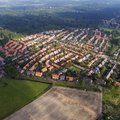
A solar heat network has proven to be technically and financially feasible for making existing neighbourhoods more sustainable and natural gas-free, as demonstrated by a consortium led by TU Delft
08 December 2020
Miguel Bessa and Richard Norte have been awarded the Interstellar Initiatives Grant

Miguel Bessa and Richard Norte have been awarded an Interstellar Initiatives Grant from the Limitless Space Institute. The award is for their research ‘Origami Photonic Crystal Sails with Machine Learning’. Their research focus is about the development and demonstration of nanoscale origami photonic crystal membranes using data-driven machine learning.
03 December 2020
Technical Medicine master students tackle COVID-19 cases
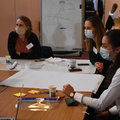
During the COVID Case Day, thirty master students from the Technical Medicine programme studied COVID-19-related cases submitted by various hospitals and health-care institutions.
02 December 2020
TU Delft software for determining contagion risk for specific locations
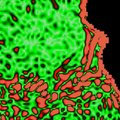
TU Delft professor of aerodynamics Fulvio Scarano, together with fluid mechanics expert Lorenzo Botto and simulation expert Wouter van den Bos, has developed software to calculate the risk of Covid-19 contagion at specific locations. The model virtually places a sick person in the space in question and simulates how quickly virus particles spread. The TU Delft researchers hope that designers will use the software to make predictions for determining whether an aircraft, classroom or restaurant, for example, is safe. The plug-in will probably become available in February.
30 November 2020
Using artificial intelligence to solve arson offences

. In partnership with the Netherlands Forensic Institute (NFI), Thijs Vlugt, Mahinder Ramdin and Otto Moultos, researchers at the Department of Process & Energy, developed a new method using artificial intelligence that can be used to solve arson offences.
30 November 2020
Arjan Mol in various media
30 November 2020
3mE researchers partner in two NWA-ORC consortia
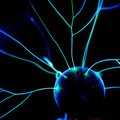
Researchers from TU Delft will work together in nine consortia with the entire knowledge chain and societal organisations, and conduct interdisciplinary research that will bring scientific and societal breakthroughs within reach. Faculty 3mE takes part in two consortia.
30 November 2020
Guido Sturm in Groente & Fruit Actueel
Twelve years ago, the first tests were already carried out with soil disinfection via microwaves. Researchers from various technical disciplines are currently working together to develop this idea into a practical application, as an alternative to soil steaming.
28 November 2020
Graphene balloons to identify noble gases
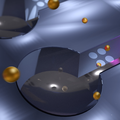
New research by scientists from Delft University of Technology and the University of Duisburg-Essen uses the motion of atomically thin graphene to identify noble gases. These gases are chemically passive and do not react with other materials, which makes it challenging to detect them. The findings are reported in the journal Nature Communications.
25 November 2020
RELEASE for Reversible Large-scale Energy Storage research is now up and running!
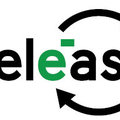
On October 22, the RELEASE (Reversible Large-scale Energy Storage) project held an online kick-off meeting with 74 attendees to announce its official launch on October 1st.
23 November 2020
Earl Goetheer in BNR
Scientists and engineers from the US have come up with a way to store electricity in a brick. "They modified it, and it works really well. But very different from a normal lithium battery, explains energy expert Earl Goetheer.
19 November 2020
New sensor chips: low-cost, smart and efficient
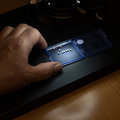
A chip with a built-in sensor that is so sensitive that it registers a single coronavirus particle. At TU Delft, several researchers in various faculties, including Frans Widdershoven (EW), Peter Steeneken, professor Dynamics of Micro and Nanosystems and Murali Ghatkesar (PME/3mE) are working on this research.
18 November 2020
A Mechanism for Designing High-Entropy Alloys with improved Magnetic Properties
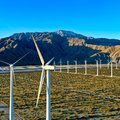
12 November 2020
Regine Vroom in Computer Idee
12 November 2020
More efficient conversion of heat into electricity by tinkering with nanostructure

Researchers TU Delft have not only been able to explain how nano-structures in thermoelectric materials can improve energy efficiency but they also propose a commercially more attractive way to manufacture nano-structured thermoelectric materials, increasing the chances for mass-production of thermoelectric energy. Their results were published in Nano Energy.
03 November 2020
Four Veni grants for faculty 3mE

This week the Dutch Research Council (NWO) has awarded a Veni grant worth up to 250,000 euros to twelve TU Delft scientists. The grant provides the laureates with the opportunity to further elaborate their own ideas during a period of three years.
02 November 2020
How a guest lecturer enhances education
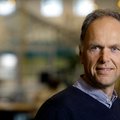
Many former students return to TU Delft later in their careers as guest lecturers. Anton Paardekooper graduated in Mechanical Engineering in 1992 and has been a guest lecturer at 3mE for six years.
02 November 2020
TU Delft presents eight Best Graduates 2021

Today, 29 October 2021, Delft University Fund announced the eight TU Delft Best Graduates 2021. Each year, TU Delft’s eight faculties nominate their Best Graduate. On 11 November, during the TU Delft Best Graduate Award Ceremony 2021, one of these eight nominees will receive the prestigious title TU Delft Best Graduate 2021.
26 October 2020
Geeske Langejans in BBC World
What makes things sticky?
20 October 2020
DIMI Stories: There’s still room on the water! by Prof. Rudy Negenborn
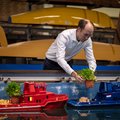
Freight transport by water is cheaper and uses less energy than by road. What’s more, there’s more room on the water than on our congested roads. We could fully exploit these benefits by first solving a few notorious bottlenecks, such as container ships that aren’t loaded to capacity, suboptimal vessel navigation and congested locks.
12 October 2020
Tim Horeman in various media
John van den Dobbelsteen and Tim Horeman, together with lab manager Rob Luttjeboer, have a successful way to test recycled sterilized masks and masks made from new materials
08 October 2020
Bart van Trigt at TU Delft TV: Prevention versus performance
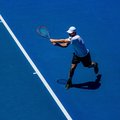
How to get the most realistic data from an athlete in action? Take it to the field!
05 October 2020
John van den Dobbelsteen in various media
TU Delft and Van Straten Medical have developed and tested a process to reuse masks safely up to five times. The process can be applied directly and by all hospitals.
01 October 2020
Sarvesh Kolekar in various media
Self-driving cars can already do quite a bit, but driving as a human being requires something that algorithms cannot do very well: being insecure and careless. A new model that maps the mechanism behind human driving should change this.
29 September 2020
Driving behaviour less ‘robotic’ thanks to new Delft model

Researchers from TU Delft have now developed a new model that describes driving behaviour on the basis of one underlying ‘human’ principle: managing the risk below a threshold level.
24 September 2020
Ajay Seth receives Chan Zuckerberg grant for Open Source Software

Ajay Seth, assistant professor at the Department of BioMechanical Engineering, has received a grant of US$190,000 from the Chan Zuckerberg Initiative DAF for his research on the development of Essential Open Source Software for Science. Ajay Seth is receiving the grant specifically for his ‘OpenSIM’ project, an open source biomechanics simulator to study movement to improve the usability, computational performance, maintenance and outreach of the OpenSim open source software and to support the education and training of its users around the world.
24 September 2020
Beach robot on the move during World Cleanup Day
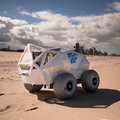
During World Cleanup Day on September 19, citizens were encouraged to clean up waste in their street and surroundings. In The Hague, participants on the beach received help from BeachBot, a robot that can recognize and clean up small waste.
18 September 2020
Erik Offerman in various media
Answer to the question of why disposable razors become dull so quickly. And what does a durable Iron Age look like?
14 September 2020
Joost de Winter in various media

Joost de Winter: "The industry is increasingly seeing the importance of research in the field of robotics. Delft engineers lead robotics solutions that enable a company to innovate its technologies."
08 September 2020
TU Delft starts programme for robot engineer of the future
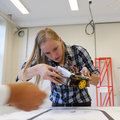
How can robots function within various processes in a factory? What is a good robot engineer according to the industry? These two questions were central in setting up the new Master's degree programme in Robotics at TU Delft.
03 September 2020
Burak Eral in various media
Burak Eral and his colleagues are developing a method that allows microparticles to be separated based on their shape.
03 September 2020
Lode Huijgens in Marine Professional
Exciting research by Lode Huijgens is helping to pave the way for the next generation of ship propulsion systems. Marine Professional finds out more.
03 September 2020
ERC Starting Grant for TU Delft researchers
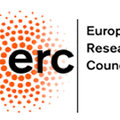
ERC has awarded its 2020 Starting Grants to early-career researchers. Two of them are scientists from TU Delft. This European funding will help individual scientists and scholars to build their own teams and conduct pioneering research.
03 September 2020
ERC Starting Grant for Peyman Mohajerin Esfahani
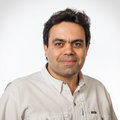
The European Research Council has awarded an ERC Starting Grant to Peyman Mohajerin Esfahani, researcher at Delft Centre for Systems and Control. The grants (1,5 million euros for a five-year programme) are intended to support scientists who are in the early stages of their career and have already produced excellent supervised work.
03 September 2020
Rudy Negenborn in various media
How can transport on the Rhine between Rotterdam / Antwerp and Basel be improved? That is the central question in the Novimove research program: Novel inland waterway transport concepts for moving freight effectively. The European Commission has allocated nearly € 9 million to this four-year program from Horizon 2020, the Framework Program for Research and Innovation.
03 September 2020
First Clinical Technology Master's students graduate in the LDE context
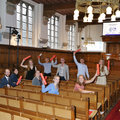
To bridge the ever-widening gap between technological innovation and medicine, the new Clinical Technology programme within the LDE alliance was launched six years ago.
03 September 2020
A protocol for flexible social distancing strategies
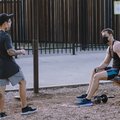
Full and prolonged levels of lockdown are unsustainable in the long run. More flexible social distancing approaches are already being applied in many countries and regions, while the tools for decision-making are still ‘work in progress’. TU Delft researchers are using applied mathematics to propose a tool for local authorities that enables them to apply a faster and more flexible approach to social distancing.
31 August 2020
Leo Kestens in NRC
Answer to the question of why disposable razors become dull so quickly.
25 August 2020
Joost Lötters appointed part-time professor at PME
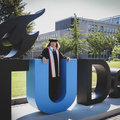
We are pleased to announce that Joost Lötters has been appointed as a part-time professor within the Department of Precision and Microsystems Engineering (PME) of the Faculty of Mechanical, Maritime and Materials Engineering (3mE).